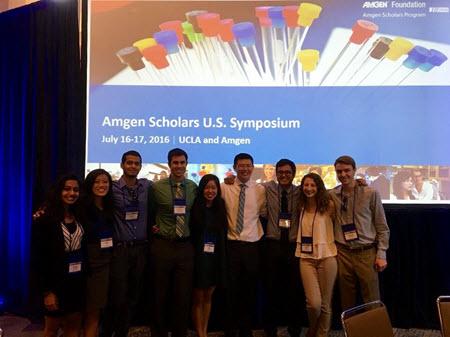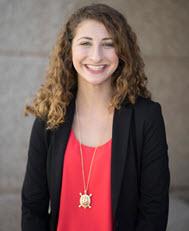Attending the 2016 U.S. Amgen Scholar Symposium
Guest post written by UCLA Amgen Scholar Rachel Sabol
As a self-proclaimed realist, I doubted that I would ever experience the fabled “love at first sight.” This changed the moment that I saw the crowd of UC Berkeley Amgen scholars lined up to register for the symposium, proudly sporting the trendiest summer internship shirts imaginable. In a creative expression of their institution, they were blazoned with the periodic table entry, Berkelium. I must say, there is something quite profound about a group of people that can make radioactive chemical elements fashionable. It had been less than five minutes at the 2016 US Amgen Scholars Symposium, and I already felt at home.
Dr. Charles Craik, professor at UC San Francisco, helped to solidify the tone of the weekend by speaking on a handful of circulating myths about scientists. For one, societal norms tell us that the scientist is a reclusive and somewhat neurotic individual, more interested in microbial interactions than human connections. Despite my best efforts to expose stereotypical impressions, the misconception of the scientist is one that I have fallen victim to time and time again. Coming from a university where I am aware of exactly one peer who has gone on to pursue a doctoral degree in the biological sciences, it has been a challenge to establish myself in a research community. As a largely collaborative individual, this had previously dissuaded me from pursuing a career in the sciences.
Dr. Craik’s encouragement and the welcoming demeanor of my peers quickly dissolved any mistaken beliefs I may have carried into the weekend.
As awe-inspiring as the magnitude of technological advancement is at Amgen, the most significant part of my symposium experience was personal interaction. To be in the midst of more than two hundred like-minded individuals was nothing short of incredible. Throughout the entire weekend, there was an electric current of potential surging through every interaction. An instantaneous community was formed by the desire to not only know each other, but to also understand something that defines a piece of all of us- our science. I may not understand the intricacies of hydrogel formation, but I do understand the necessity of building a community that will relentlessly pursue solutions for some of today’s most challenging problems. This sentiment was most clearly embodied by a statement from one of Amgen’s scientists: “We’re not competing against each other, we’re competing against the science.”
If you are passionate about the pursuit of knowledge in the sciences, but hesitant to enter the field due to stereotypes, I implore you to reconsider. There is a small but powerful community that aches to solve the same problems that you do. As Philip Tagari, VP of research at Amgen, says, “Science is hard.” We are attempting to cure stubborn and relentless diseases that affect the lives of those we love. We are trying to answer questions that have plagued humanity for decades, with little to no advancement. This path is too hard to attempt on your own. Take comfort in knowing that you don’t have to.
To learn more about the Amgen Scholars Program, please visit AmgenScholars.com and check out the #AmgenScholars hashtag on Twitter. Follow @AmgenFoundation to stay up to date with all STEM-related news from the Amgen Foundation.




